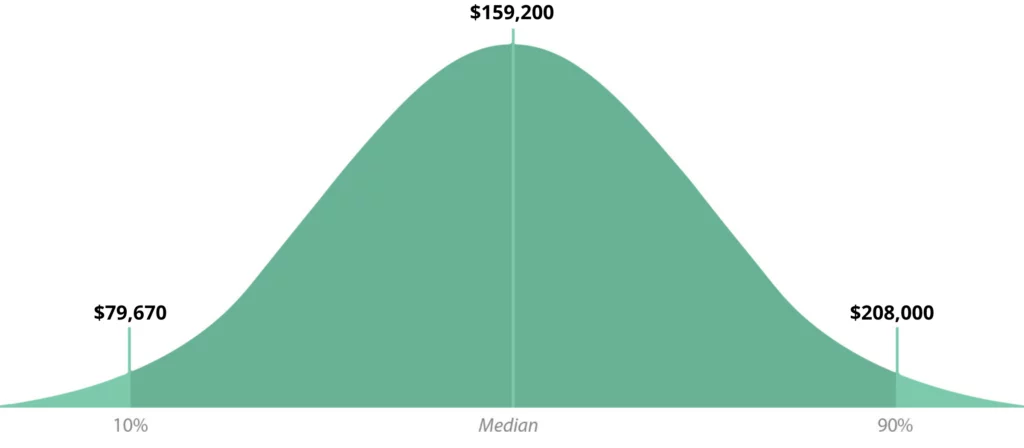How to Become a Dentist

Table of Contents
1. Overview: Job Responsibilities, Salary, and Common Requirements
2. A Comprehensive Guide to Becoming a Dentist
4. Signs You Should Consider Becoming a Dentist
6. What are the Knowledge and Skills Needed to be a Dentist?
7. Popular Schools and Colleges in the U.S. for Aspiring Dentists
8. How to Get a Job as a Dentist
9. Learn About Geographic and Location Pay Differentials
10. Make Your Resume Stand Out
Overview
Job Responsibilities
- Meet patients to discuss dental concerns
- Teach patients proper dental care
- Perform teeth cleaning and other preventive procedures such as filling cavities, root canal, and tooth extraction
- Prescribe medication to patients with dental problems
- Examine the X-ray results of teeth, jaw, and gums
- Give clients sedatives and anesthesia before the treatments
- Organize patients’ treatment records
How Much Does a Dentist Make?
Dentists made a median salary of $159,200 in 2019. The best-paid 10 percent earned $208,000 that year, while the lowest-paid 10 percent earned $79,670.

Common Requirements
- Doctor of Dental Surgery (DDS) or Doctor of Medicine in Dentistry (DMD)
- State license
- Certification or specialty state license may be required
- Excellent written and verbal communication skills
Similar Careers
Orthodontists
Oral and Maxillofacial Surgeon
Prosthodontist
Chiropractors
Dental Assistants
Dental Hygienists
Medical Scientists
Optometrists
Physicians and Surgeons
Podiatrists
Common Skills
Communication skills
Interpersonal skills
Good management skills
Manual dexterity
Restorative dentistry procedures
Removing tooth deposits
Applying fluoride treatments
Comprehensive knowledge of dental procedures
MEDIAN SALARY
$159,200 per year
$76.54 per hour
JOB OUTLOOK
3%
NUMBER OF JOBS
151,600
A Comprehensive Guide to Becoming a Dentist
Oral health is essential to the overall health of a human’s body. Not only is it part of good grooming and aesthetics, but it also prevents infections and diseases throughout your body. Dentists encourage their patients to maintain a healthy mouth through oral care and regular dental checkups.
Many Americans prioritize their oral health. According to a report from ADA News, dentists topped the most seen practitioner Americans want to see often. There are 85% of Americans who believe that oral care is essential to overall health.
Aside from the reason that dentists are one of the well-paid medical professionals, there are several other good reasons why you should pursue a career in dentistry. You will have a chance to help people to improve their health, well-being, and make a difference in their lives. You can even be your own boss by building your own business and earn more.
What Does a Dentist Do?
Dentists are physicians whose specialization is oral health. They either earned a degree in Doctor of Dental Medicine (DMD) or a Doctor of Dental Surgery (DDS). As far as anyone knows, dental care is not only limited to teeth and gums. The areas of dental care also include the jaw, tongue, salivary glands, as well as the head, neck, and the nervous system. They perform checkups and examine these areas to spot warning signs such as swellings, discolorations, lumps, and ulcerations that might indicate diseases and help them perform appropriate procedures.
Dentists typically do the following:
- Meet patients to discuss dental concerns
- Teach patients proper dental care
- Perform teeth cleaning and other preventive procedures such as filling cavities, root canal, and tooth extraction
- Prescribe medication to patients with dental problems
- Examine the X-ray results of teeth, jaw, and gums
- Give clients sedatives and anesthesia before the treatments
- Keep and organize patients and treatments records
Signs You Should Consider Becoming a Dentist
Before choosing a profession in dentistry, it is crucial that you assess yourself if you are competent in most areas that are required in this field. Don’t be disheartened if you do not possess most of the traits and characteristics that are mentioned below, as you can always work yourself to improve in these areas. Here are five signs that you will enjoy working as a dentist.
1. You are creative
Dentistry does not only require excellent practical skills and scientific knowledge, but it also requires creativity. A competent dentist possesses the creative talent because they will need this in performing cosmetic procedures such as teeth whitening, realigning of the jaw, or restoring a patient’s smile. They must envision the end-result of a procedure aesthetically and how it will look to the patient.
2. You like to be around people
Dentists are very comfortable around people, even if their patients have bad breath issues. Interpersonal skill is an important trait of dentists because they spend their time with patients, with their face and hands so close to the faces of their patients. They also have good social skills and can deal with different people from all walks of life—making them feel welcomed, understood, accepted, and in good hands.
3. You are trustworthy
Honesty is important in dentistry. Patients are expecting that their dentists should honestly check their oral health, offer the highest quality of oral care, and treat patients with the utmost respect. There are fundamental guides and ethical practices that dentists should practice for them to perform their job legally and hold a special position of trust in society.
4. You have strong attention to detail
This is an important skill a dentist must possess. The mouth is a small space to work in for a dentist. Thus, attention to detail is a must. They must focus on the smallest detail of the teeth and gums. If you don’t focus on the details and miss something during treatment, you might harm the patient during or after treatment.
5. Love for learning
A career in dentistry is perfect for people who are excited to learn the latest information, theories, studies, and technology in their field. These latest ideas are essential in improving the prevention and treatment of patient’s oral health problems.

How To Become a Dentist?
In order to become a dentist, there are several requirements that you need to complete. Let’s go over how to become a dentist with the steps below:
1. Earn a bachelor’s degree program
There is no specific college major or pre-dental required. Still, it would be helpful if students complete coursework in physics, biology, chemistry, or other science-related degree fields. This is to help students meet the prerequisites that might be required before entering dental school. Studying an undergraduate degree in pre-dentistry or science will also give a head start.
2. Take the Dental Admissions Test (DAT)
For you to enroll in a dental school, you must have earned a degree and passed the Dental Admission Test (DAT). The DAT should be taken a year before you plan to enter dental school. This exam assesses the knowledge and academic capacity of the students.
3. Earn a Doctorate in Dentistry
It takes about four years before students receive their doctorate in dentistry. They may either earn a dental doctoral degree in:
- Doctor of Dental Surgery (DDS)
- Doctor of Medicine in Dentistry (DMD)
These two dental doctorate degrees mean the same thing and have the same coursework. The school will determine what degree a student would be awarded.
4. Obtain licensure
All states require dentists to be licensed for them to practice dentistry, and the requirements are different in every state. Although the requirements in every state vary, most state requires dentists to complete three things:
- A degree in DDS or DMD from an accredited dental program.
- Pass the written National Board Dental Examination (NBDE).
- Pass the state or regional clinical examination.
Completing these requirements makes you a bonafide dentist and can practice dentistry in your chosen state.
5. Choose a dental specialization
The National Commission on Recognition of Dental Specialties and Certifying Boards (NCRDSCB) currently recognizes ten dental specialties.
- Dental Anesthesiology
- Dental Public Health
- Endodontics
- Oral and Maxillofacial Pathology
- Orthodontics and Dentofacial Orthopedics
- Oral and Maxillofacial Radiology
- Pediatric Dentistry
- Periodontics
- Oral and Maxillofacial Surgery
- Prosthodontics
Obtaining a specialization will require a dentist an additional two to four years of further education and up to two years of residency before earning a specialty state licensure for your chosen specialization.
What are the Knowledge and Skills Needed to be a Dentist?
In addition to the requirements and steps mentioned in the previous topic, aspiring dentists should have specific skills to become more successful in this field. Below are the particular qualities, knowledge, and skills a dentist should possess.
Communication skills
You should be a good communicator to speak to your patients and colleagues effectively. This is so to be able to give an accurate diagnosis, explain the oral care routine or treatments to the patient that is easily understood, and avoid misunderstanding. Having communication skills will improve patient outcomes and satisfaction.
Manual dexterity
Manual dexterity is the ability of the hands and fingers to produce small, precise movements. Since dentists work with the mouth of patients, they must have superior eye and hand coordination to ensure precision in treating the problem areas and the safety of the patients. If you do not like working with your hands and get frustrated easily doing motor skills and hand-related activities such as painting, drawing, carving, or learning musical instruments, then you might have a hard time becoming a dentist. However, if you are eager to become a dentist but do not possess manual dexterity, you can still improve on this by taking part in the activities we just mentioned.
Restorative dentistry procedures
These are procedures performed by dentists to keep their patient’s mouth healthy and functional to avoid future oral health issues. Restorative dentistry procedures include:
- Teeth whitening
- Contouring
- Veneers
- Composite Bonding
- Fillings
- Bridges
- Implants
- Root Canals
- Extractions
- Dentures
Removing tooth deposits
Dentists should know how to clean a patient’s teeth. They should know how to use special tools such as a dental scaler to remove tartar, plaque, and food particles from the patient’s teeth. Dentists might also perform root planing or cleaning below the gum line to prevent gum diseases.
Applying fluoride treatments
Fluoride treatment is important because it helps prevent cavities by protecting your tooth enamel that fights the bacteria harming your teeth and gums. Dentists have different ways on how they apply fluoride treatments on their patients since they come in various forms: rinse, foam, gel, or varnish.
Popular Schools and Colleges in the U.S. for Aspiring Dentists
The Commission on Dental Accreditation (CODA) is an American dental association that provides accreditation to dental schools and dental-related education programs. To find more information about dental schools and programs, you may visit the CODA website.
NICHE published on its website the 2020 top colleges for dental studies in America. Below are the top 50 schools in their list:
- The Utah College of Dental Hygiene, Orem, UT
- University of Southern California, Los Angeles, CA
- New York University, New York, NY
- Carrington College – Sacramento, Sacramento, CA
- University of Michigan – Ann Arbor, Ann Arbor, MI
- Carrington College – San Jose, San Jose, CA
- University of North Carolina at Chapel Hill, Chapel Hill, NC
- Carrington College – Boise, Boise, ID
- University of the Pacific, Stockton, CA
- The Ohio State University, Columbus, OH
- Fox College, Bedford Park, IL
- Eastern International College – Jersey City, Jersey City, NJ
- IBMC College – Fort Collins, Fort Collins, CO
- Concorde Career College – Garden Grove, Garden Grove, CA
- University of Detroit Mercy, Detroit, MI
- Pacific University, Forest Grove, OR
- University of Missouri – Kansas City, Kansas City, MO
- ECPI University – Virginia Beach, VA, Virginia Beach, VA
- University of Pittsburgh, Pittsburgh, PA
- University of Minnesota – Twin Cities, Minneapolis, MN
- Concorde Career College – San Diego, San Diego, CA
- Remington College – Nashville, Nashville, TN
- Concorde Career College – San Bernardino, San Bernardino, CA
- West Liberty University, West Liberty, WV
- Fortis College – Salt Lake City, Salt Lake City, UT
- Oregon Institute of Technology, Klamath Falls, OR
- Herzing University – Minneapolis, St. Louis Park, MN
- University of Bridgeport, Bridgeport, CT
- Ultimate Medical Academy – Clearwater, Clearwater, FL
- North Dakota State College of Science, Wahpeton, ND
- Concorde Career Institute – Dallas, Dallas, TX
- Fortis College – Phoenix, Phoenix, AZ
- Fortis College – Landover, Landover, MD
- Concorde Career College – Aurora, Aurora, CO
- Vermont Technical College, Randolph Center, VT
- Concorde Career College – San Antonio, San Antonio, TX
- Rutgers University – New Brunswick, Piscataway, NJ
- Texas A&M University, College Station, TX
- Carrington College – Mesa, Mesa, AZ
- Colorado Northwestern Community College, Rangely, CO
- University of New England, Biddeford, ME
- St. Paul’s School of Nursing – Staten Island, Staten Island, NY
- Fortis College – Columbia, Columbia, SC
- University of South Dakota, Vermillion, SD
- SUNY Farmingdale State College, Farmingdale, NY
- West Virginia University, Morgantown, WV
- Fox Valley Technical College, Appleton, WI
- Indiana University-Purdue University – Indianapolis (IUPUI), Indianapolis, IN
- University of Louisiana – Monroe, Monroe, LA
- West Coast University – Orange County, Anaheim, CA

How to Get a Job as a Dentist
Here are some tips you can consider as you start your search for your first job as a dentist.
Search for job openings online
This is the easiest way and cost-effective way of finding a job. You can search and access thousands of job openings at the comfort of your own home, explore opportunities near your area and even outside your state or country if you prefer. Here are the most used job search engine websites that you can try.
- indeed
- flexjobs
- Dental Staffing
- CareerBuilder
- Dice
- Glassdoor
- Google for Jobs
- Idealist
- LinkUp
- ZipRecruiter
- USAjobs.gov
Join state and local dental societies and organizations
Professional organizations will help you meet other dentists and get the latest news and updates in the field of dentistry. You will get a chance to meet new people who are dentists as well who can help you find a job. Also, some of the organizations’ websites post dental job listings. Below is the list of dental associations and organizations where you can join.
- ADA – American Dental Association
- ADEA – American Dental Education Association
- AGD – Academy of General Dentistry (Know Your Teeth)
- ASDA – American Student Dental Association
- AAPD – American Academy of Pediatric Dentistry
- AAP – American Academy of Periodontology
- ACP – American College of Prosthodontists
- AAO – American Association of Orthodontists
- AAOMS – American Association of Oral and Maxillofacial Surgeons
- AAOMR – American Association of Oral and Maxillofacial Radiology
- AAPHD – American Association of Public Health Dentistry
- AAOMP – American Academy of Oral & Maxillofacial Pathology
- American Association of Dental Examiners State and Regional Contacts
- State Dental Associations List
Learn About Geographic and Location Pay Differentials
Geographic areas often have location pay differentials—making a significant impact on your potential earnings. Some states offer a higher salary and some with a lower wage to dentists.
Here’s a list of the average mean annual revenues of dentists in every state according to the latest data from the Bureau of Labor Statistics’ Occupational Employment Statistics dated 2019. Note that Vermont does not have a salary data for 2019:
| State | 2019 Mean Annual Wage |
|---|---|
| Delaware | $264,440 |
| Alaska | $259,350 |
| Rhode Island | $254,190 |
| Minnesota | $227,280 |
| New Hampshire | $226,300 |
| Connecticut | $213,390 |
| Wisconsin | $213,210 |
| North Dakota | $212,380 |
| North Carolina | $212,160 |
| Nevada | $210,710 |
| Maine | $203,920 |
| Virginia | $199,870 |
| South Dakota | $198,170 |
| Michigan | $197,490 |
| Ohio | $197,150 |
| Hawaii | $196,690 |
| Missouri | $191,240 |
| Oregon | $190,690 |
| Iowa | $187,570 |
| Arizona | $186,870 |
| Tennessee | $186,670 |
| Texas | $185,680 |
| Washington | $184,780 |
| Indiana | $183,800 |
| Kansas | $179,100 |
| State | 2019 Mean Annual Wage |
|---|---|
| Massachusetts | $177,410 |
| Georgia | $176,600 |
| Colorado | $174,930 |
| New Mexico | $173,610 |
| South Carolina | $172,780 |
| Idaho | $172,020 |
| Alabama | $171,900 |
| Illinois | $171,590 |
| Montana | $170,260 |
| New Jersey | $169,990 |
| Florida | $167,270 |
| Arkansas | $165,480 |
| New York | $164,520 |
| Oklahoma | $156,060 |
| Kentucky | $154,230 |
| Pennsylvania | $153,950 |
| Mississippi | $153,810 |
| Maryland | $151,950 |
| California | $151,490 |
| West Virginia | $139,170 |
| Utah | $138,970 |
| Nebraska | $135,080 |
| Wyoming | $125,120 |
| Louisiana | $124,020 |
| Vermont | No Available Data |
Report from the Bureau of Labor Statistics
Make Your Resume Stand Out
The first step in applying for a job is submitting your resume. If you want to get noticed by the employer and increase your chances of getting invited for an interview, then you need a well-written resume. To set you apart from the rest of the candidates and secure your spot for employment, here are some tips on how to write a stellar resume.
1. Professional or Profile summary
Your professional summary is your introduction and the first thing (aside from your contact information) an employer sees in your resume. The purpose of a professional summary is to tease the employer by giving a short overview of your achievement/s and what you can offer to the company. This is well-suited for experienced dentist job seekers because this gives them a chance to highlight their accomplishments and skills in the field of dentistry.
Example:
Hardworking and committed dentist with five years of experience in oral diagnosis, cosmetic procedures, prosthodontics, and restorative dental treatment, and more. New York State license with specialization in Dental Public Health. Introduced a new method that increased patient satisfaction by 63%.
2. Work or Dental Experience
According to the BLS, dental jobs will grow by 3% faster than the average growth rate of all other occupations from 2019–2029 in the U.S. On top of that, according to U.S. News, dentists ranked top 1 in Best Healthcare Jobs, top 2 in 100 Best Jobs, top 2 in Best STEM Jobs, and top 10 in Best Paying Jobs. This data proves that the competition is tight as the dentistry is in high demand.
Amplifying your work or dental experience in your resume will help you beat your competitors. A well-written experience section will demonstrate that you have the qualifying skills and experience that will be an asset to your prospective employer. This section should include your previous role titles, employers or companies, dates of tenure, responsibilities, acquired skills, and accomplishments. It should also be in reverse chronological order.
3. Relevant skills
In some formats of resumes, the relevant skills section comes first before the work experience section. If your skill section is well-put-together, you can help your prospective employer assess quickly if you are the right fit for the job. Include both soft and hard skills that you possess as a dentist. Soft skills will demonstrate you are a nice person for the job while the hard skill will display that you are a capable employee for the job. Such soft skills a dentist should have are attention to detail, communication, problem-solving, compassion, and a people person. On the other hand, some of the hard skills a dentist should possess are dental assessment, fluoride treatment, preventive dentistry, restorative procedures, and taking X-rays.
As much as possible, the skills that you will include should match the skills required by the employer that is posted to the job requirement section of the advertisement.
4. Licenses and certifications
You should include licenses and certifications section on your resume to prove that you are licensed to perform dentistry in the state where you are applying for.
5. Education
List the latest education first and work backward but do not include your high school education.
For Example:
Doctor of Dental Surgery (DDS)
University of Southern California, Los Angeles, CA
BS in Health Science
University of Southern California, Los Angeles, CA
Relevant Coursework: Anatomy and Physiology, Biology, Chemistry, Public Health, Biochemistry, Health and Human Hygiene.
Ace Your Dentistry Interview
Before you attend your interview, you need to take note of the cases you have handled, experienced, and the procedures you have practiced. Most likely, the interviewer will ask situational interview questions, experience verification questions, opinion questions, and behavioral questions. Here are some of the commonly asked interview questions.
1. Why did you pursue a career in dentistry?
Even if you came from a family of dentists and got inspired to be a dentist because of them, it is important that you reflect and state your personal reason why you want to be a dentist. You can give a realistic view of what dentists do that you really admire. Show the interviewer that you like interacting with patients, your interest in science, or even your personal experience with a dentist that inspired you and made you pursue a career in this field.
2. What is the advantage of being a dentist?
This question will demonstrate your understanding of the reality of being a dentist. Although this question may sound cynical, you must still keep a positive tone to your answer. This is by stating the common problems or negative aspects in the field of dentistry; you should also explain how you handle those and how you overcome those challenges.
3. How would you tell a patient that their tooth needs to be extracted?
This is most patients’ worst nightmare and one of the main reasons why they are terrified of going to a dentist. This question will demonstrate your empathy for your patients. It does not mean that you should be emotionally involved in the situation. As a dentist, you should still maintain a level of professionalism with your patients. It is important that the patient understands clearly why you need to perform the extraction procedure and its implications if you don’t extract the tooth.
4. What would you do if a patient disagreed with your dental health assessment?
You cannot please all of your patients. What the interviewer wants to know is how you respect your patient’s values and how far you would go to meet your patient’s needs and satisfaction. It is important that you demonstrate your conflict resolution strategies, courteousness, and professionalism under this kind of situation.
5. How would you conduct routine dental procedures?
Answer this question by giving details of the application you have studied and practiced in your day to day work as a dentist. Show to the interviewer how comfortable you are performing the dentistry routine and handling patients of different ages and backgrounds. Also, showcase your knowledge in the latest training, guidelines, and technology that are essential in dentistry.
Top Online Courses for Aspiring Dentists
Sharpen your skills in dentistry by taking these top online courses
Skills Success has carefully curated and organized thousands of online video courses. Start your journey to becoming a dentist with these top online courses that you can use to improve your soft skills and personal development.
Customer Reviews














